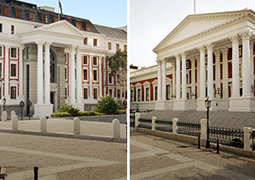
Parliament, Thursday, 21 March 2024 – In this 30th year of our country’s democracy, Parliament is proud of the achievements of South Africans, through their Parliament, in passing progressive laws that have changed the face of our society from a people tormented by inhumane apartheid laws to a society that proudly affirms human rights and equality for all.
This we did with the Constitution as our guide – particularly the Bill of Rights – which is the cornerstone of South Africa’s democracy and guarantees everyone living in this country a life of dignity, equality and fairness.
Today, the Speaker of the National Assembly, Ms Nosiviwe Mapisa-Nqakula, and the Chairperson of the National Council of Provinces, Mr Amos Masondo, not only celebrate with South Africans on this commendable track record in transformative legislative changes but also call on all South Africans to reflect, protect and defend the gains we have made as a country with human rights.
Human Rights Day in South Africa is historically linked with the events in Sharpeville on 21 March 1960 when 69 people died and 180 were wounded when police fired on a peaceful crowd that had gathered to protest against the Pass laws. This day marks an affirmation by ordinary people, rising in unison to proclaim their rights. It became an iconic date in our country’s history that we commemorate as Human Rights Day every year to remind us how far we have come for these hard-won rights and the cost many had paid.
In the past year, Parliament has passed several laws to bolster some of the already affirmed human rights. Among them is the National Health Insurance Bill (NHI) which will ensure the right to access quality health care for everyone. The right to access the best possible health care is a universal human right that should be guaranteed to all. In processing the NHI Bill, Parliament was cognisant of its Constitutional obligation to ensure that no one is deprived of access to quality health care because of their social standing.
The rights of people living with disabilities have also been promoted through the passing of the 18th Constitutional Amendment Bill. This Bill amends section 6 of the Constitution to include South African Sign Language (SASL) as the 12th official language to promote the rights of persons who are deaf and hard of hearing. The Bill also helps ensure a “cultural acceptance of sign language and deaf culture”. President Cyril Ramaphosa has since signed the Bill into law, which means it is now an Act that must be implemented.
Violence against women remains one of the prominent human rights challenges still plaguing our society. This week, the NCOP passed the National Council on Gender-based Violence Bill, which seeks to, among others, establish the National Council on Gender-based Violence and Femicide. The aim is to set up a multi-sectoral, independent, and non–partisan statutory body, which acts through its Board and is responsible for providing strategic leadership on addressing gender-based violence and femicide in South Africa. This Bill is the latest in a series of laws that Parliament had passed to protect women.
Meanwhile, Parliament has not only been championing human rights within the borders of South Africa. Speaker Mapisa-Nqakula is part of the Inter-Parliamentary Union Task Force, tasked with contributing solutions to the Russia and Ukraine situation.
More notably, South Africa recently reaffirmed its status as a defender for human rights through its historic case at the International Court of Justice over the actions of Israel in Gaza. With debates and resolutions, Parliament has also done its part in highlighting the humanitarian crisis in Gaza.
As we celebrate Human Rights Day today, we do so recognising that we cannot claim to be free or enjoy our freedom until the people of occupied Palestine are free. We also do so in recognition that the people of Western Sahara are also engaged in a long-running territorial dispute over their land, leaving many living in camps. The International Human Rights laws encourage all humans, all nations, and all organs of society to strive to promote respect for all people’s freedoms and rights to dignity and equality.
ISSUED BY THE PARLIAMENT OF THE REPUBLIC OF SOUTH AFRICA
Enquiries: Moloto Mothapo

